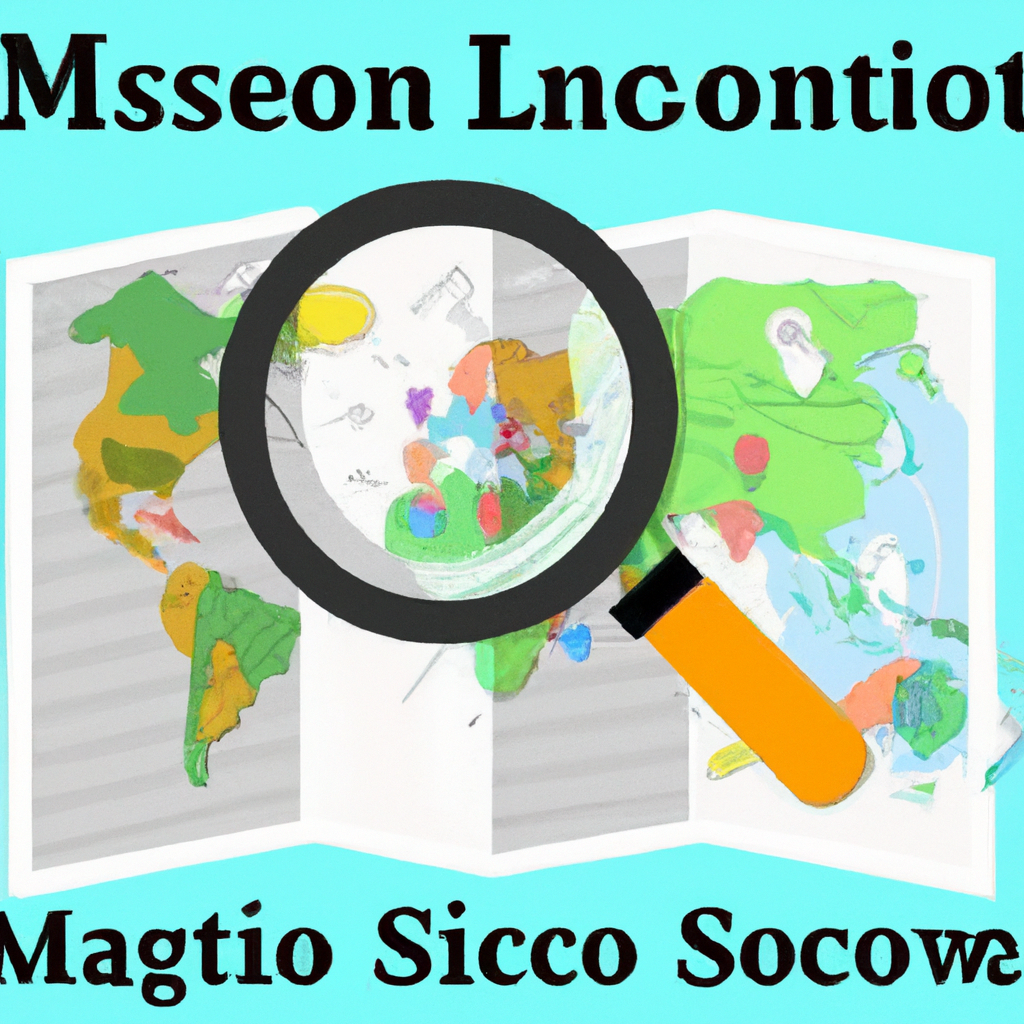So you’ve heard about this thing called local SEO and you’re wondering how you can cash in on it? Well, you’re in the right place! In today’s article, we’re going to explore the ins and outs of making money with local SEO. Whether you’re a small business owner looking to drive more customers to your doorstep or an aspiring entrepreneur looking to provide local SEO services, we’ve got you covered. From optimizing your website for local searches to leveraging online directories and review platforms, we’ll share practical tips and strategies to help you boost your visibility and, ultimately, your revenue. So grab a cup of coffee and let’s get started on your journey to making money with local SEO!
Choose a Niche
Identify your target audience
When it comes to making money with local SEO, the first step is to identify your target audience. This is crucial in order to tailor your strategies and services to meet their specific needs. Ask yourself who you want to reach with your local SEO services. Is it small businesses in a certain industry? Local service providers? Or maybe even local online retailers? Once you have a clear understanding of your target audience, you can start crafting your local SEO strategies to cater to their needs.
Research local keyword opportunities
After identifying your target audience, it’s time to dive into keyword research. Take the time to research local keywords that are relevant to your target audience’s industry or niche. Look for keywords that your potential clients are likely to use when searching for local products or services. This can give you insight into the specific terms you should be targeting in your local SEO efforts.
Analyze competition in the chosen niche
Once you have identified your target audience and researched local keyword opportunities, it’s important to analyze the competition in your chosen niche. Take a look at the local businesses that already dominate the search results for your target keywords. Study their websites, their local SEO strategies, and their online presence. By understanding what your competition is doing, you can find ways to differentiate yourself and offer unique value to your clients.
Build a Local SEO Strategy
Optimize your website for local search
To make money with local SEO, it’s crucial to optimize your own website for local search. This means incorporating relevant local keywords into your website content, meta tags, and title tags. You should also consider adding local schema markup to your website to provide search engines with additional information about your location and services. Furthermore, ensure that your website is mobile-friendly and fast, as this can greatly impact your search engine rankings.
Claim and optimize Google My Business listing
Google My Business (GMB) is a powerful tool for local SEO. Claiming and optimizing your GMB listing is essential for appearing in local search results and attracting local customers. Make sure to provide accurate and detailed business information, choose an appropriate business category, and upload high-quality photos and videos. Encourage your customers to leave reviews and respond to them promptly, as this can greatly impact your online reputation and visibility.
Create and optimize local landing pages
To further boost your local SEO efforts, consider creating and optimizing dedicated landing pages for specific locations or services. These pages should highlight location-specific information and include relevant local keywords in headings and content. Make sure to display contact details prominently and embed Google Maps and directions for easy navigation. Including customer testimonials from the local area can also help build trust and credibility with potential clients.
Implement structured data markup
Structured data markup can provide search engines with additional information about your business, making it easier for them to understand and index your website. Consider adding local business schema markup, including ratings and reviews markup, FAQ schema markup, breadcrumb schema markup for improved site navigation, and event schema markup for local events. By implementing structured data markup, you can enhance your visibility in search results and attract more local customers.
Build quality backlinks from local websites
Building quality backlinks is an important aspect of any SEO strategy. When it comes to local SEO, it’s especially beneficial to build backlinks from local websites. Research and reach out to local businesses and organizations in your target area and industry. Consider guest blogging on local industry websites, submitting your website to local business directories and online listings, and participating in local events and sponsorships. Building relationships with local influencers and bloggers and engaging with local online communities can also help you generate quality backlinks and increase your visibility in local search results.

Offer Local SEO Services
Create a portfolio to showcase your expertise
If you want to make money with local SEO, it’s important to showcase your expertise and success in the field. Create a portfolio that showcases local SEO case studies and success stories. Highlight client testimonials and reviews to demonstrate your ability to deliver results. Share blog posts and articles that showcase your knowledge and understanding of local SEO. Additionally, present before-and-after reports that highlight the tangible improvements you have made for your clients. Including relevant certifications and credentials can further boost your credibility and attract potential clients.
Provide consultation and audit services
Offering consultation and audit services can be a great way to attract clients and generate income with local SEO. Start by offering initial website and SEO audits to potential clients. Identify areas for improvement in their local SEO strategies and provide recommendations and strategies to help them improve their online visibility and attract more local customers. Make sure to monitor the performance and results of your clients’ local SEO campaigns and implement tracking and reporting tools to keep them informed about the progress you’re making together.
Execute on-page and off-page optimization
Executing on-page and off-page optimization strategies is a core component of any local SEO service. On-page optimization involves optimizing website content, meta tags, title tags, and other elements to make them more search engine friendly. Off-page optimization involves building quality backlinks, engaging with local online communities, and participating in local events and sponsorships. By offering on-page and off-page optimization services, you can help your clients improve their online visibility and attract more local customers.
Offer local keyword research and analysis
Helping clients identify the right local keywords for their business is a valuable service in the realm of local SEO. Offer local keyword research and analysis to help clients understand the search terms their potential customers are using and how to target them effectively. By providing this service, you can help your clients optimize their website content, meta tags, and other elements to maximize their visibility in local search results.
Provide Google My Business optimization
As mentioned earlier, Google My Business is a powerful tool for local SEO. By offering GMB optimization services, you can help clients claim and optimize their GMB listings, ensuring accurate and detailed business information, appropriate business categories, and high-quality photos and videos. You can also assist in managing customer reviews and regularly updating the listing with relevant posts. By optimizing their GMB listings, you can help your clients attract more local customers and improve their online visibility.
Help businesses with local content creation
Content creation is essential for any successful SEO strategy. By offering local content creation services, you can help businesses create valuable and relevant content that appeals to their local audience. This can include blog posts, articles, videos, infographics, and more. By publishing local content regularly, businesses can attract and engage local customers while boosting their search engine rankings.
Offer local citation building and management
Local citations refer to mentions of a business’s name, address, and phone number (NAP) on other websites, directories, and online listings. These citations play a crucial role in local SEO. By offering local citation building and management services, you can help businesses build a strong online presence and improve their local search rankings. This involves ensuring consistent and accurate NAP information across various online platforms.
Optimize Website for Local Search
Do thorough keyword research
Before optimizing your website for local search, it’s important to conduct thorough keyword research. Identify the local keywords that are most relevant to your target audience and industry. Look for niche-specific keywords and long-tail variations that can help you attract local customers. By understanding the search terms your potential customers are using, you can optimize your website content to align with their needs and preferences.
Incorporate keywords naturally into website content
Once you have identified the relevant local keywords, it’s time to incorporate them naturally into your website content. Avoid keyword stuffing, as this can negatively impact your search engine rankings. Instead, focus on creating high-quality, informative, and engaging content that appeals to both search engines and users. When writing website content, aim to naturally include the identified local keywords in your headings, subheadings, paragraphs, and anchor texts.
Optimize meta tags and title tags
Meta tags and title tags are important elements of your website’s HTML code. They provide search engines with information about your web pages. To optimize your website for local search, make sure to include the identified local keywords in your meta tags and title tags. Craft compelling and descriptive meta descriptions that entice users to click on your search result. Keep your title tags concise and informative, including the relevant local keywords at the beginning if possible.
Add local schema markup to website
Local schema markup is a type of structured data markup that provides search engines with additional information about your business and its location. By adding local schema markup to your website, you can enhance your visibility in local search results and provide users with valuable information about your business. Local schema markup can include details such as your business name, address, phone number, business hours, and customer reviews.
Ensure website is mobile-friendly and fast
In today’s mobile-driven world, having a mobile-friendly website is crucial for local SEO success. Make sure your website is optimized for mobile devices, providing a smooth and user-friendly experience for visitors accessing your site from their smartphones or tablets. Additionally, ensure that your website loads quickly, as slow loading times can negatively impact both user experience and search engine rankings. Tools like Google’s PageSpeed Insights can help you identify and fix any speed-related issues.
Implement SSL certificate and secure your website
Website security is an important consideration for local SEO. Having a secure website not only protects user data but also boosts your search engine rankings. Implementing an SSL certificate ensures that data transmitted between your website and users is encrypted and secure. Additionally, search engines like Google have indicated that SSL certificates can impact search rankings. By securing your website with an SSL certificate, you can enhance your website’s trustworthiness and visibility in search results.

Claim and Optimize Google My Business Listing
Create or claim your GMB listing
To make the most of Google My Business (GMB), start by creating or claiming your listing. If your business has a physical location or serves customers in a specific geographical area, having a GMB listing is essential for local SEO. Follow the steps provided by Google to create or claim your listing and verify your ownership of the business.
Provide accurate and detailed business information
When optimizing your GMB listing, it’s crucial to provide accurate and detailed business information. Make sure to include your business name, address, phone number, website URL, and any other relevant contact details. Keep in mind that consistency is key, so ensure that the information you provide matches the details on your website and other online platforms.
Choose an appropriate business category
Choosing the right business category is important for optimizing your GMB listing. Select a category that accurately represents the nature of your business. This helps Google understand what your business offers and improves your chances of appearing in relevant search results. Be specific and choose the most accurate category from the available options.
Upload high-quality photos and videos
Visual content plays a crucial role in attracting customers and improving your online visibility. Take the time to upload high-quality photos and videos that showcase your business, products, services, and team. This allows potential customers to get a glimpse of what your business has to offer and can greatly enhance the appeal of your GMB listing.
Encourage customer reviews and respond to them
Customer reviews are an important aspect of local SEO. Encourage your customers to leave reviews on your GMB listing. Positive reviews can boost your online reputation and attract more local customers. Respond to reviews promptly and professionally, whether they are positive or negative, to show your dedication to customer satisfaction and engage with your audience.
Regularly update listing with relevant posts
Google My Business offers the option to post updates and announcements directly to your listing. Take advantage of this feature by regularly posting relevant and engaging content. This can include news, promotions, events, and other information that is valuable to your local audience. By regularly updating your GMB listing, you can keep your audience informed and engaged.
Create and Optimize Local Landing Pages
Creating and optimizing local landing pages is an effective local SEO strategy to attract targeted traffic and convert leads into customers.
Highlight location-specific information
Local landing pages should highlight location-specific information that is relevant to your target audience. This can include details about your physical location, service area, contact information, and any other information that helps potential customers understand where you are located and how they can reach you.
Include local keywords in headings and content
Optimizing local landing pages with the appropriate local keywords is essential. Include these keywords naturally in your headings, subheadings, and content to improve your visibility in local search results. However, be sure to avoid keyword stuffing, as it can negatively impact your search engine rankings.
Display contact details prominently
Make it easy for potential customers to contact you by prominently displaying your contact details on your local landing pages. This includes your phone number, email address, and any other relevant methods of communication. By making it easy for customers to reach out to you, you can increase your chances of generating leads and conversions.
Embed Google Maps and directions
Embedding Google Maps on your local landing pages can provide potential customers with an easy way to find and navigate to your business. Including clear directions and a map of your location can eliminate any confusion and make it more likely for customers to visit your physical store or office.
Include customer testimonials from the local area
Customer testimonials are powerful social proof that can influence potential customers’ purchasing decisions. Include testimonials from local customers on your local landing pages to demonstrate your credibility and reputation within the local community. This can greatly enhance your chances of attracting new customers and generating more business.

Implement Structured Data Markup
Add local business schema markup
Implementing local business schema markup can provide search engines with additional information about your business, such as your name, address, phone number, opening hours, and customer reviews. By adding local business schema markup to your website, you can enhance your visibility in local search results and provide users with valuable information that stands out.
Include ratings and reviews markup
Ratings and reviews markup helps highlight the positive feedback and testimonials your business has received. By implementing this type of structured data markup, you can potentially increase the visibility of your star ratings and review count in search results. This can improve your online reputation and attract more local customers.
Implement FAQ schema markup
FAQ schema markup allows search engines to display frequently asked questions and answers directly in the search results. Adding FAQ schema markup to your website can enhance the visibility and accessibility of your FAQs, making it more likely for potential customers to find the information they need and engage with your business.
Add breadcrumb schema to improve site navigation
Breadcrumb schema markup can improve the navigation of your website by displaying hierarchical links in the search results. This can help users better understand the structure of your website and navigate to specific pages more easily. Implementing breadcrumb schema markup not only enhances user experience but also provides search engines with valuable information about your website’s organization.
Utilize event schema markup for local events
If your business hosts or participates in local events, utilizing event schema markup is essential. Adding event schema markup to your website can help search engines understand the details of your events, such as the date, time, location, and description. This can increase the visibility of your events in search results and attract more attendees from the local area.
Build Quality Backlinks from Local Websites
Research and outreach to local businesses and organizations
One of the most effective ways to build quality backlinks from local websites is through research and outreach to local businesses and organizations. Identify complementary businesses or industry-related organizations in your local area and reach out to them, offering to collaborate on content or other mutually beneficial initiatives. By building relationships with local businesses, you can increase your chances of earning relevant backlinks.
Guest blogging on local industry websites
Guest blogging is a popular and effective method for building quality backlinks. Identify local industry websites that accept guest posts and reach out to them with your pitches. Offer to write informative and relevant articles that provide value to their audience. In return, you can include a link back to your website or specific landing pages within your guest post. By leveraging the authority of established local websites, you can boost your own website’s credibility and visibility.
Submit to local business directories and online listings
Submitting your website to local business directories and online listings is a simple yet effective way to build quality backlinks. Look for reputable local directories that are relevant to your industry or niche. Ensure that your business information is accurate and consistent across all directories and listings. These backlinks not only improve your website’s visibility but also provide additional avenues for potential customers to find you.
Participate in local events and sponsorships
Participating in local events and sponsorships not only allows you to contribute to your local community but also opens up opportunities for building quality backlinks. Consider sponsoring local events, hosting workshops or seminars, or endorsing community initiatives. In return, event organizers or other participants may link to your website, acknowledging your support. These backlinks from local event websites can greatly enhance your local SEO efforts.
Build relationships with local influencers and bloggers
Building relationships with local influencers and bloggers can be a valuable strategy for obtaining quality backlinks. Identify influential individuals or popular bloggers in your local area who have a significant following in your target audience. Engage with them on social media, invite them to local events or offer them exclusive discounts or free samples of your products or services. If they find value in what you offer, they may mention or link to your business on their websites or social media platforms.
Engage with and contribute to local online communities
Engaging with and contributing to local online communities is a great way to build relationships with other local businesses and individuals. Join local forums, groups, or social media communities that are relevant to your industry or target audience. Participate in discussions, share valuable insights and information, and provide helpful advice. By actively engaging with the community, you can establish yourself as an authority and increase the likelihood of obtaining quality backlinks from other community members.

Create a Portfolio to Showcase Your Expertise
Showcase local SEO case studies and success stories
When offering local SEO services, it’s important to showcase your expertise and the success you have achieved for your clients. Create a portfolio that showcases local SEO case studies and success stories. Highlight the specific challenges your clients faced, the strategies you implemented, and the results you achieved. By showcasing your past successes, you can demonstrate your ability to deliver results and attract potential clients.
Highlight client testimonials and reviews
Client testimonials and reviews are powerful tools for building trust and credibility. Include testimonials from satisfied clients in your portfolio to show potential clients the positive experiences others have had with your services. If possible, include the client’s name, business, and any relevant details that enhance the authenticity and credibility of the testimonial. By highlighting client testimonials, you can instill confidence in potential clients and increase the likelihood of them choosing your services.
Demonstrate knowledge by sharing blog posts and articles
Sharing blog posts and articles that demonstrate your knowledge and understanding of local SEO is a great way to showcase your expertise. Create informative and valuable content that addresses common questions or challenges faced by your target audience. By regularly publishing blog posts and articles on your website or guest posting on relevant industry websites, you can establish yourself as an authority in the field and attract potential clients who are seeking your expertise.
Present before-and-after reports
Before-and-after reports are concrete evidence of the results you have achieved for your clients. Include detailed reports in your portfolio that outline the specific improvements you made for each client and the impact it had on their business. These reports can include metrics such as increased website traffic, higher search engine rankings, improved conversion rates, and increased revenue. By presenting before-and-after reports, you can provide potential clients with tangible evidence of your ability to deliver results.
Include relevant certifications and credentials
Adding relevant certifications and credentials to your portfolio can help build trust and credibility with potential clients. Include any formal certifications or qualifications you have obtained that are directly related to local SEO. This can include certifications from recognized organizations such as Google’s Academy for Ads, Moz, or HubSpot. By displaying your certifications and credentials, you demonstrate your commitment to staying up-to-date with industry best practices and techniques.
Provide Consultation and Audit Services
Offer initial website and SEO audits
Providing initial website and SEO audits is a valuable service that can help potential clients understand the current state of their online presence. Conduct a comprehensive audit of their website, identifying areas for improvement in their local SEO strategies. Evaluate their website structure, on-page optimization, off-page factors, and overall user experience. By offering audits, you can identify specific challenges and opportunities for improvement, which can then be addressed through your consultation services.
Identify opportunities for improvement in local SEO
After conducting website and SEO audits, identify specific opportunities for improvement in your client’s local SEO strategies. Provide recommendations on how their website can be optimized for local search, including keyword targeting, content enhancements, and on-page optimization. Additionally, analyze their off-page factors, such as backlink profiles and local citations, and provide strategies for improving their online presence in the local community. By identifying opportunities for improvement, you can demonstrate your expertise and value to potential clients.
Provide recommendations and strategies to clients
Based on your consultations and audits, provide clients with detailed recommendations and strategies for improving their local SEO. This can include specific actions they should take to optimize their website, enhance their online presence, and attract more local customers. Provide a clear roadmap and action plan, complete with prioritization of tasks and estimated timelines. By offering actionable recommendations and strategies, you can assist clients in achieving their local SEO goals and generating more business.
Monitor local SEO performance and results
Monitoring the performance and results of your clients’ local SEO efforts is crucial in ensuring their success and satisfaction. Implement tracking and reporting tools to measure key performance indicators such as website traffic, search engine rankings, and conversion rates. Regularly review and analyze these metrics to provide your clients with up-to-date insights into the progress they are making. By monitoring their local SEO performance, you can make data-driven recommendations for further improvements and optimizations.
Implement tracking and reporting tools
Implementing tracking and reporting tools is essential for effectively monitoring and reporting on your clients’ local SEO performance. Utilize tools like Google Analytics, Google Search Console, and third-party SEO reporting platforms to track website metrics, keyword rankings, and other relevant data. Generate regular reports for your clients, highlighting the key performance indicators and progress made. By providing comprehensive tracking and reporting, you can demonstrate the value of your services and keep your clients informed about the results they are achieving.




